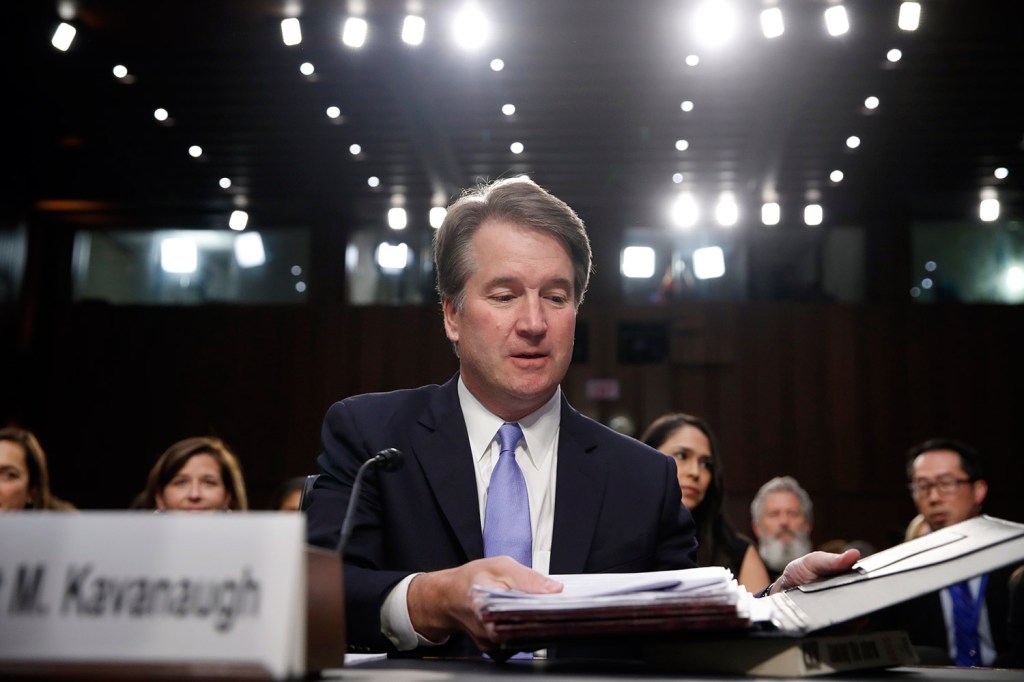In the wake of John McCain’s death, the country — and even more surprisingly, our nation’s capital — experienced a few blessed days when partisan rancor was washed away by tears of grief and love of country.
Then came Tuesday, when the bitter divisiveness that has defined Washington in recent years returned with Senate confirmation hearings for Supreme Court nominee Brett Kavanaugh.
Frequent disruptions by protesters and interruptions by Senate Democrats calling for a delay in the hearings led Texas Sen. John Cornyn, a Republican, to call the scene “mob rule.” Illinois Sen. Dick Durbin, a Democrat, heard something altogether different, calling it the “noise of democracy.”
How unruly was opening day? As Senate Judiciary Committee Chairman Chuck Grassley recalled Wednesday, “Democratic senators interrupted the hearing 63 times before lunch, and in the audience 70 people were arrested yesterday who were following their lead.”
Who was following whose lead is open to debate. But what’s clear from the opening salvos is that Democrats have launched a no-holds-barred approach to blocking President Donald Trump’s second Supreme Court nominee.
Meanwhile, the Trump administration’s last-minute release of 42,000 pages of documents regarding Kavanaugh’s service in the White House under President George W. Bush and the claim of executive privilege hasn’t given much comfort to those who want a full vetting of the nominee.
Trump nominee Neil Gorsuch was confirmed by the Senate in April 2017 after the Republican-controlled Senate refused to consider President Barack Obama’s 2016 nomination of Judge Merrick Garland to fill the seat of the late Antonin Scalia, long seen as a conservative standard-bearer.
As we wrote in March 2016, Senate Republicans’ refusal to give Garland a full hearing “shamed themselves and the institution they represent.” But delaying judicial nominees for political reasons is by no means new. In 2001, Democrats successfully blocked President George W. Bush’s nomination of Miguel Estrada to the U.S. Court of Appeals for the D.C. Circuit for over two years. Estrada eventually withdrew without a vote.
Senate Democrats are at least fulfilling their constitutional duty to offer “advice and consent” and most likely, given Kavanaugh’s undeniable qualifications for the nation’s highest court, there will be a full vote on the Senate floor.
But, as with Judge Robert Bork, President Ronald Reagan’s 1987 nominee, Democrats are hoping to paint Kavanaugh, a devout Catholic, as dangerously out of touch with mainstream America, especially with reproductive rights as decided in Roe v. Wade, the 1973 Supreme Court decision that recognized a woman’s constitutional right to abortion.
On Wednesday, in an exchange with California Sen. Dianne Feinstein, a Democrat, Kavanaugh said he considers Roe “settled law.” Asked if it was “correct law,” Kavanaugh said the decision has “been reaffirmed many times.”
He then referred to the 1992 Supreme Court decision in Planned Parenthood v. Casey that reaffirmed the rights granted in Roe. This, Kavanaugh explained, created “precedent upon precedent.”
Kavanaugh faced numerous questions regarding his views on executive power and whether the president can pardon himself. Although he refused to offer an opinion on a president’s pardoning power, he said, “No one is above the law in our constitutional system.” And stated he believes a “good judge” is one who is not “swayed by political or public pressure.”
These statements take on increasing importance given special counsel Robert Mueller’s ongoing probe of Russian interference in the 2016 presidential campaign.
Obviously, Kavanaugh was eventually confirmed to the D.C. Circuit Court where he, as a former Yale Law School professor of his wrote in The New York Times in July, has “helped decide hundreds of cases concerning a broad range of difficult issues.”
In that opinion piece, titled “A Liberal’s Case for Brett Kavanaugh,” Akhil Reed Amar said Trump promised to nominate “someone with impeccable credentials, great intellect, unbiased judgment, and deep reverence for the laws and Constitution of the United States. In picking Judge Kavanaugh, he has done just that.”
Despite the hysterics this week, it’s hard to see how Kavanaugh won’t soon be sitting in the seat left vacant by retiring Justice Anthony Kennedy — a Reagan appointee Kavanaugh once clerked for and still considers a “mentor, a friend and a hero.”
On Tuesday, amid partisan sniping and grandstanding, Kavanaugh went on to call Kennedy “a model of civility and collegiality” who “fiercely defended the independence of the judiciary.” All partisanship aside, that sounds like a good model to follow, especially in these uncertain times.
Editorial by The Dallas Morning News
Visit The Dallas Morning News at www.dallasnews.com
Distributed by Tribune Content Agency, LLC.
Copy the Story LinkSend questions/comments to the editors.



Success. Please wait for the page to reload. If the page does not reload within 5 seconds, please refresh the page.
Enter your email and password to access comments.
Hi, to comment on stories you must . This profile is in addition to your subscription and website login.
Already have a commenting profile? .
Invalid username/password.
Please check your email to confirm and complete your registration.
Only subscribers are eligible to post comments. Please subscribe or login first for digital access. Here’s why.
Use the form below to reset your password. When you've submitted your account email, we will send an email with a reset code.